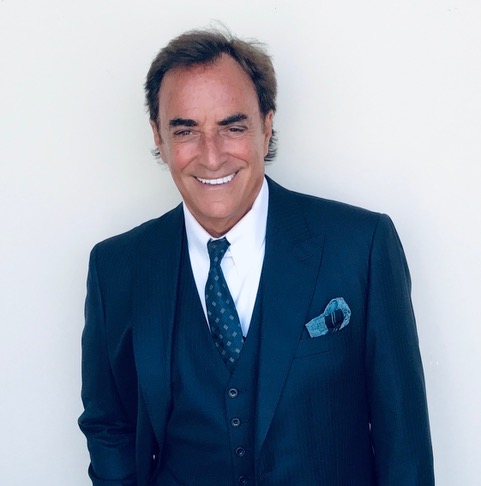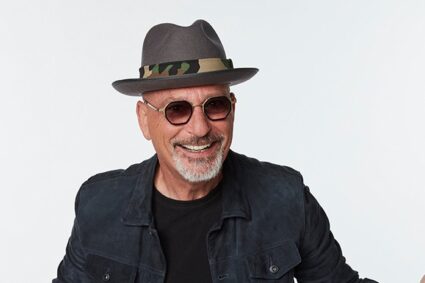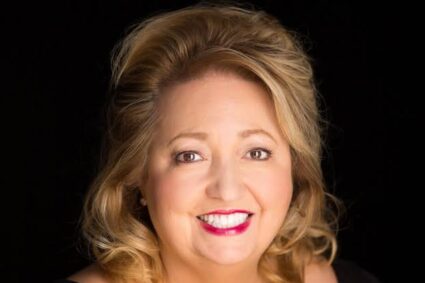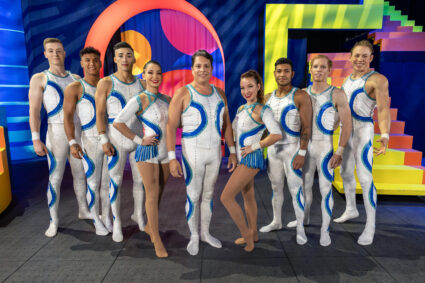
On today’s edition of SNAPSHOTS, during his more than four decade run on the long running soap opera “Days of Our Lives”, our guest has kept the plots twisting and turning as playing the two look-alike villains, Count Tony DiMera and his impersonator, André DiMera but now he pours his lifelong passion for archaeology and all things grease into the new podcasts, “The Lost Treasures”.
The adventure story explores “The Iliad” and “The Odyssey” through the life of German archaeologist Heinrich Schliemann, who changed history when he discovered the real-life locations and treasures in the epic poems written and narrated by our guest. The four-part podcast, three story chapters enhanced with immersive audio effects, and a fourth that features a reading from the guest himself, explaining why he embarked on it. It’s Ross from the 60,000 pages, he had exclusive access to the long-hidden documents and diaries.
My friends, let’s welcome to SNAPSHOTS, Thaao Penghlis
Welcome to SNAPSHOTS, Thaao!
Thank you. Actually, the name Schliemann, even though he’s good, I’m sure he’ll give a mouthful. They’re having to explain these stories that I’ve spent the last 20 years exploring and then decided one day I should write about these wonderful ancient tales that have been crashed and burned on these characters and walk the ancient Earth and that we looked upon as myths. And then now they’re actualities. And so I went exploring in Greece.
One of my favorites is the third episode, which is about finding where the real island of Ithaca that was part of the Ulysses’ Odyssey. And so, I went there and met with archaeologists and geologists and the producers of The Odyssey Foundation and actually trekked up and down the mountains and sitting in places and walking through areas where Ulysses resided, and actually went swimming into the into focus Bay, which is where he came after the 20 years away, which was 10 years of the trend more than 10 years after, when he was.
So, I went swimming into those ancient waters, and walked along that beach. Sometimes people talk about an experience, but then forget it. But when you really explore things and you get into the heart of it, something else happens to you that sustains your memory & part of that foundation you build for you. At this stage of my life, it’s kind of my last Renaissance, as opposed to drawing a new outlet other than to sit for the last 14 years. It’s been something of a real tracking through all those documents and seeing all the treasure that that he discovered. The big treasure was stolen during the Second World War by the Russian brigade that Stalin had sent in because the Germans but also much from Russia, the Germans tell so much from Europe. And now are in different museums in the world. Museums are filled with stolen art and that belong to families, or other countries in the found anything in the earth, but when you have something ancient, that hasn’t been touched in 4,000 years, it’s exciting to me, because it is a story that hasn’t been told.
And I remember reading that one of your dreams before you became an actor, was to become an archaeologist. So, is this podcast, your way of really diving into that world and satisfying that dream of becoming an archaeologist?
Yeah, because the full form will explain what it was like because somebody asked me “Have you ever discovered anything? Have you noticed anything?” I’ve walked into a tomb that had been found. And when they opened the door, I was the first person to go through and in over 4000 years. And so that makes a difference to how you and then I’ve touched ancient treasures that are in Egypt from the sands. There’s a big difference between seeing it in a glass case visiting a museum as opposed to something you have.
And because to me, it’s like you’re unraveling your own mystery. So, in many ways, yes. It has satisfied an area of myself that wanted to be an archaeologist. I would say to somebody, show me a column, I’ll tell you a story. But you know, that I chose a different route but the show gave for me was all the wonderful discoveries that I have made up myself and other cultures. And so that’s archeology in itself, or is it anthropology? I’m finding that, how do you stay in life where you still have longevity? And I think, to me, it’s curiosity.
So, it’s interesting, you’ve got Days of Our Lives is my foundation and other words that are done through the years. And yet, they were able to pay for all the journeys, because it’s not cheap. Traveling and going to places, hiring guides and archaeologists and sharing that knowledge. It’s a wonderful way of knowing there’s a part of you that had not been explored when you’re younger, but was clearly agreed.
From what I understand that your research actually began when you visited the National Archaeological Museum in Athens, and somebody recognize you from another role – that from “Mission: Impossible”, is that right?
Yeah, you know there are recognitions, and there are recognition. Some people just recognize you, because they get excited because something about your character had resonated with them. But this particular this particular experience was to go into my heritage. The year before was a totally different experience. Now suddenly, you see what celebrity does for you. So the doors open. Smiles is not that gruff exterior that you get from people when you ask questions, and they’re too busy, or demands them too many times. This opened us to a meeting the Minister of Culture because the minister then opened the doors for me to the Gennadius Library, a catalyst of 60,000 documents. The Minister of Culture yet got me permission to go into Sleiman’s house, or his palace in Athens that was closed at the time and hadn’t been open for many, many years.
CONTINUED
And that leads me to another question, since you mentioned earlier, that you’ve been a great actor on the soap opera stage to Mission: Impossible for over four decades. You started the year that I was born, which is crazy. What were some of the challenges of transitioning from acting in television, to taking this dream and turning it into a podcast? What were some of the challenges, asides from the constant travel constant research that you had to do to condense it all into a podcast?
Good question. If I was just in a mission was a different thing. It gave you much more acknowledgment from your peers. Somehow, I didn’t know why. They taught me the hardest. I mean, the most difficult of them all, more than film, television & theater, I found service because the amount of dialogue yet retain and justify its existence. You were just at the edge of the dialogue. You couldn’t get into the next stage of the performance, because of those challenges, it really built a foundation. I find that when you’re traveling, there’s a lot of dangerous situations that can pop up if you’re not being careful. Or if you’re not aware, even coming from the airport in a foreign land, you’ve got to know where you are, where do you find your guides, the right cab driver who will take you to the right place. And that’s all part of where you shop and the tools of your intuition.
And because of that kind of challenge that I had, almost every day with Days, it allowed me the element where I was building a foundation that I didn’t even know I was standing on until I was tested. And so when you have things like being where they kind of kidnapped me at the pyramids at night, or where Hezbollah pulled me out of my car in southern part of Lebanon, and thinking I was an Israeli spy. Then you see the hatred on the face of the Lebanese thinking “Hezbollah guy”. I looked at his face, I remember the hate. I thought, “Oh, my God, that hate he has for these Israelis and here I was a Greek. And he couldn’t tell the difference.
You know, thank God for the UN but all these are part of why you train yourself in life. Life continues to keep you being trained, or you can stay at home and sit on the couch and be careful with life without ever having to really test it yourself. I found that because of the setup, as opposed to when I did a miniseries, or when I did series and get directors say to me, “I’m looking at your training.” For, I didn’t depend on a director to direct me because he had no time. But at the same time, I knew how to focus the camera on me by the action I took. And that was because I did 40 years of training in the theater.
There was a big director and his day and he was a great teacher. He told me how to self-direct myself. So all that was part of the training, not just as an actor, but also as an individual, because he demanded that you get to know that the big secret in life is unraveling, once you came in as who you become.
Now, I couldn’t be remiss that we have to touch on a little bit about the loss of Bill Hayes, who was one of your co stars on Days of Our Lives who passed away in February. What is one fond memories you have of working with Bill?
You know, some people when they get older, become very short, impatient, frustrated, not their lives didn’t resolve anything. The one thing about I must say about Bill and Susan, is that every time we spoke, they’re taken another journey. So because we resonated that way, I became close to them. I must say my relationship with Susan, in the beginning was a bit of a conflict. Because she was test she’s a real tester, what your main, but we overcame that, and we became good friends.
And I remember how he would after I would do a performance was something that he was watching. Because I’m on the stage during a ceremony or something, he would always be the first to come up the generosity of this man, and she, and how much they appreciated my training and what I brought to the show, they always reminded me of that. And then of course, when I started to write and she read the two books I’ve written. And then I remember in December, this lovely human being, who was losing his eyesight, I was so happy to hear the podcast at the last precious, hold me up and said to me before Christmas, of how much pleasure he got the imagery and the sound effects that were in that podcast that just took him into the ancient world and how much he appreciated. And that was the last time we spoke, and I said to him about, we must break bread again. And and then he passed but we had a completion in many ways.
When I look back at it now, it was almost as if he pardoned and said goodbye, but the way we spoke and so I send them flowers. The ceremony was really beautiful. Susan was just so gracious and so was Deidre Hall. We will never see the likes of these again. Very true. Yes. You know, he was so talented in so many areas. He had accomplished so much in his life. You know, you go through life and you say, “who was your treasured in life?” I can name a few, not many, but he certainly was one of them.
What do you hope people will take away from your podcast since your podcasts been around for six months now?
Well, I just did a big interview with Greek for gal and a big spread. For me, it was like going back to my roots. Which was not just about archaeology, but it was also about my heritage, because history goes back to the 15th century, my family, in Constantinople and in Egypt, in Alexandria. So, in many ways, by telling these stories, you’re reminding people of what heroes the discovery of things that are in museums today that when we have that experience and come out, it’s managed that much richer. I think also the idea of travel is one of the best parts of education that an individual can give themselves. Because in the end, when you walk through that door out of that front door, and you’ll return from the journey, something about your will have changed.
By understanding other cultures, it makes your culture even more important because you want to investigate where you came from. So it’s a reminder of ancestors. It’s a reminder of what great heroes came before. And, and also, it’s an education on, on the dangers and the preparedness one must have before they go to foreign cultures, because everybody thinks differently. They’re not all the same. We’ve been brought up with different thoughts, different religions, different foods, different education, different landscapes. And so when you put all that together, it’s fun. When you go into that, you bring your foreigners into that path, and then you exchange it in the best possible way. So the story is, in many way, about, as I said, about a life well lived.
You can follow Thaao on social media


